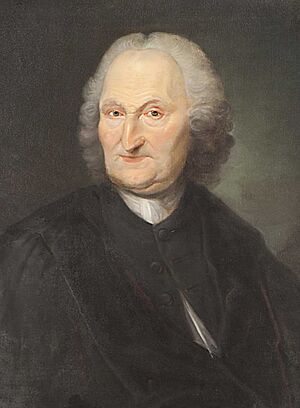Tiberius Hemsterhuis facts for kids
Tiberius Hemsterhuis (born January 9, 1685 – died April 7, 1766) was a smart Dutch scholar. He was known for studying old languages and texts, and for sharing his ideas about them. People called him a philologist and a critic.
Contents
About Tiberius Hemsterhuis
His Early Life and Studies
Tiberius was born in a city called Groningen in the Netherlands. His father was a doctor who knew a lot, and he made sure Tiberius got a great education from a young age. When he was just 15, Tiberius started studying at the university in his hometown. He was especially good at mathematics.
After a couple of years in Groningen, he moved to the University of Leiden. He was drawn there because of a famous professor named Perizonius. While at Leiden, Tiberius helped organize all the old books and papers in the library. Even though he became a professor of math and philosophy in Amsterdam when he was only 20, he had already started to focus on learning ancient languages.
Becoming a Professor
In 1717, Hemsterhuis was asked to become a professor of Greek at the University of Franeker. He took over from another scholar named Lambert Bos. He started this job in 1720. Later, in 1738, he also became a professor of national history.
Two years after that, he was invited to teach the same subjects at the University of Leiden. He stayed there until he passed away on April 7, 1766. Tiberius was also the father of another famous thinker, Frans Hemsterhuis.
His Important Books and Ideas
In 1706, Tiberius Hemsterhuis finished editing a book called Onomasticon by Julius Pollux. Another scholar, Jean-Henri Lederlin, had started the work. Even though people in his home country praised him, a famous English scholar named Richard Bentley sent him two critical letters. These letters upset Tiberius so much that he didn't open a Greek book for two months!
Despite this, Hemsterhuis became very important. He started a new way of studying old texts in the Netherlands. This way of thinking became known as the "Dutch school of criticism." Many other scholars followed his ideas, including Lodewijk Caspar Valckenaer, Jacob van Lennep, and David Ruhnken.
Here are some of his main writings:
- Luciani colloquia et Timon (1708)
- Aristophanis Plutus (1744)
- Notae, etc., ad Xenophontem Ephesium (notes on Xenophon of Ephesus)
- Observationes ad Chrysostomi homilias (1784)
- Orationes (1784)
- He also translated a play called Birds by Aristophanes into Latin.
- He wrote notes for books by other scholars like John Barnard, Alberti, Johann August Ernesti, and Pieter Burmann the Younger.
See also
- Friedrich Ludwig Abresch - a Dutch scholar who was influenced by Hemsterhuis's teachings


